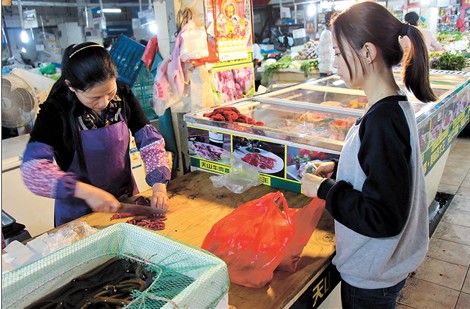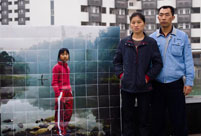 |
| Yie Mon Kyaw shops at a wet market on Dongchuan Road in Minhang District. (Shanghai Daily/ Ti Gong) |
Once upon a time, Shanghai was considered a cheap place to live by expatriates. That’s hardly the case now. Foreigners living in the city, especially students who aren’t on fat salaries, are finding it harder and harder to cope with rising prices.
In fact, Shanghai is the second costliest city in China for expats, after Hong Kong, according to a survey released in July by US consulting firm Mercer. In world rankings, Shanghai comes 14th, up two notches from last year. It’s now more expensive for an expat to live in Shanghai than in New York, according to the survey.
“Shanghai is a very costly city to live in,” said Yie Mon Kyaw, 22, a student from Myanmar in her junior year at Shanghai Jiao Tong University. “Living costs, excluding tuition and accommodation fees, have gone up about 35 percent in the last three years.”
Indeed, inflation has been a persistent economic problem for China in recent years as food, housing and other daily costs rise, pinching the pocketbooks of ordinary people — both locals and expats.
Shanghai's Consumer Price Index in September rose 2.5 percent from a year earlier, according to the Shanghai Bureau of Statistics. Housing rose 4.7 percent, while food prices gained 4.6 percent.
Cutting back
Yie said she has had to reduce spending to cope with the rising costs of food, clothing, transport and entertainment.
She first came to Shanghai in August 2010 to do preparatory course work for a major in cultural industry management at the School of Media and Design. At the time, her monthly living costs were less than 2,000 yuan (US$322), excluding tuition and accommodation fees, she said. Today, those same costs have risen to about 3,000 yuan.
Yie has adopted creative strategies to save money. She shops at a nearby wet market and at a low-cost supermarket at the campus on Dongchuan Road in Minhang District. Fluent in Mandarin, she is able to bargain over prices with street vendors. She often cooks her own meals in her dormitory kitchen, uses “black,” or illegal taxis, watches for big discounts at department stores, books film tickets via online group-purchase websites and buys clothing on China’s largest e-commerce platform taobao.com.
To earn some money, Yie crafts jewelry from jade, gemstones and pearls bought in her native Myanmar. She sells the jewelry to friends and online. Her mother, a jewelry designer, has a shop in the southwestern province of Yunnan. Her parents subsidize some of her daily living costs and the 60,000 yuan in fees for tuition and accommodation every year.
Hunger pains
Food is a big expense for expats, especially for those who prefer their native cuisines and have to buy imported products to make hometown dishes. Yie said food costs her at least 2,000 yuan a month.
In her hometown of Rangoon, a bowl of noodles costs about 7 yuan, compared with 12 yuan in small, down-market Shanghai eateries.
Foreign students often don’t like the food served in university canteens, she said. Many prefer to eat out. For Yie and her friends, Thai restaurants are the best because the cuisine is close to Burmese in style and taste. A meal out costs about 30 yuan per person, on average, after friends split the bill.
Her prowess at bargaining is a godsend.
“I ask food stall owners if they would charge me less or give me extra shallots or red peppers for free if I buy other vegetables,” she said.
Transport is also a drain on the pocketbook. Yie said when she first came to the city, the minimum taxi fare in Minhang was 10 yuan. Now it’s 12 yuan.
“If we are in a group of three or four, we sometimes hail taxis because we can share the cost,” she said. “But if we are just two, we take the Metro.”
When Yie and her friends go to downtown areas like Xujiahui, they use “black” cabs because the campus is far on the outskirts of town and Metro travel is not convenient. Even with the discount a friendly driver gives them, the cost to get from the campus area to downtown Shanghai still runs about 30 yuan per person, she said.
Whenever she comes across clothing she likes in shops, she searches for the brands on Taobao, comparing prices carefully to look for the best bargains.
“Clothing in department stores in China is way too expensive,” she complained.
She also visits Qipu Road, a well-known market for cheap clothes, and bargains for the best prices.
She recalled with a smile the stall owner who wanted 100 yuan for a piece of clothing. She countered with an offer of 15 yuan.
“She started cursing me, but I have a thick skin,” Yie said.
The shop owner told Yie 15 yuan was impossible. Yie countered by offering 20 yuan and said she would buy two pieces at that price. The deal was done.
It’s harder to bargain when it comes to entertainment costs.
Price gouging
“Cinemas are expensive,” she said, noting that a ticket can cost up to 100 yuan during popular weekend screening times. Buying tickets with Chinese friends at group-purchase online sites helps cut the cost.
Yie said she is vigilant about watching for sales.
“I ask shop assistants when sales will be on, and then I call friends from New Zealand, Indonesia, South Korea and Malaysia to invite them on a shopping trip,” she said. “Sharing information is invaluable.”
Like many expats, Yie complains about price-gouging.
“I have been overcharged a lot of times,” she said. “The most unpleasant experience in Shanghai is visiting doctors."
Once when she was suffering from a stomach ailment, she was charged 4,000 yuan for medicine by a traditional Chinese medicine doctor at Shanghai Hongqiao Hospital. The doctor said her intestinal track was in serious decline.
Her parents, concerned about the diagnosis, took her to a hospital in Singapore. Doctors there said they could find no serious problems and said the medicine she was prescribed in Shanghai should not have cost more than 800 yuan.
“I don’t dare go to hospitals in Shanghai after that experience,” she said. “And many overseas students tell of similar experiences.”
Yie’s roommate Lynn, an American student who declined to give her surname, also said she has found it tough to live on a limited budget amid rising prices.
“Students are not rich, and many overseas students don’t get much financial support from their families,” said Lynn.
 Low wages Indian migrant laborers
Low wages Indian migrant laborers Five fighters in flight training
Five fighters in flight training London mayor hails free trade, subway system on China tour
London mayor hails free trade, subway system on China tour Different eye catching shows at housing fairs in China
Different eye catching shows at housing fairs in China Special family portraits call attention to left-behind children
Special family portraits call attention to left-behind children Migrant children’s pain and joy in city
Migrant children’s pain and joy in city Lingerie show dazzles Wuhan Motor Show 2013
Lingerie show dazzles Wuhan Motor Show 2013  Running in fun customs at Beijing Int'l Marathon
Running in fun customs at Beijing Int'l Marathon  Weekly Sports Photos
Weekly Sports Photos Chinese riot police take Liberia peacekeeping mission
Chinese riot police take Liberia peacekeeping mission World has never been dark-- a blind kid’s life in Tibet
World has never been dark-- a blind kid’s life in Tibet Oriental education or western education?
Oriental education or western education? China in autumn: Kingdom of red and golden
China in autumn: Kingdom of red and golden U.S. Senate leader announces bipartisan deal
U.S. Senate leader announces bipartisan deal Chinese screen goddesses from Beijing Film Academy
Chinese screen goddesses from Beijing Film Academy Day|Week|Month